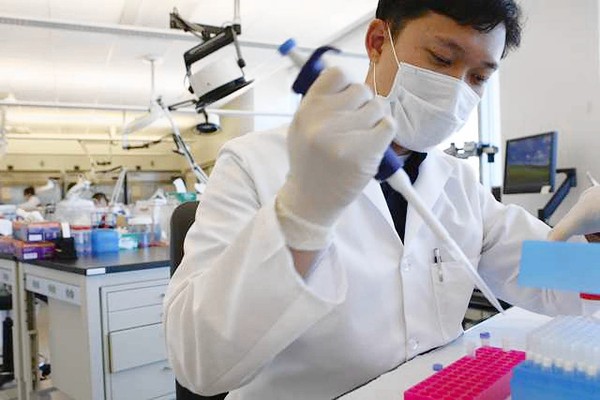|
.........
LAPD chief sees progress in analyzing DNA evidence
At one time over 6,000 samples were waiting to be tested
~~~~~~~~~~~~~~~~~~~~~~~~~~~~~~~~~~~~~~~~~~~~~~~~~~~~~~~~~~~~~~~~~~~~~~~~~~~~~~~~~~~~~
 |
 Criminalists process evidence at the Hertzberg-Davis Forensic Science Center in Los Angeles. Criminalists process evidence at the Hertzberg-Davis Forensic Science Center in Los Angeles.
On Friday, Chief Charlie Beck received an award from the California Forensic Science Institute
for his efforts on addressing the department's DNA evidence. |
|
LAPD chief sees progress in analyzing DNA evidence
Since 2008, the department has aggressively pushed to test DNA samples collected from incidents of rape and sexual assault. On Friday, Chief Charlie Beck was honored by the California Forensic Science Institute for his efforts.
by Joel Rubin
Los Angeles Times
December 11, 2010
The Los Angeles Police Department this week announced that it has made considerable progress in analyzing DNA evidence from thousands of rapes and sexual assaults that had been left untested. Police officials acknowledged, however, the department has more work to do to resolve the DNA backlog.
Police Chief Charlie Beck was honored Friday by the California Forensic Science Institute for his efforts on the issue. Gov.-elect Jerry Brown, who, as attorney general, orchestrated the use of new DNA testing in a serial killer case this year, and two others were also honored. |
|
In late 2008, former Police Chief William Bratton, under pressure from victim advocate groups, tasked Beck with getting a handle on thousands of pieces of DNA evidence that had languished in police storage freezers for years.
The department counted 6,132 untested rape kits containing samples of semen, blood, hair or other DNA material collected from victims' bodies and crime scenes. Analysis of the material can help identify perpetrators by matching the collected DNA to the genetic profiles of felons in law enforcement databases.
The Los Angeles County Sheriff's Department announced that it, too, had thousands of untested kits. Both agencies are committed to clearing the backlogs and, going forward, to test all viable kits.
The LAPD used funds gathered through federal grants, public sources and private donors to launch an aggressive push to outsource the testing of evidence kits to private labs. At the same time, it pressed elected officials for special permission to hire more analysts for its own understaffed laboratory despite a citywide hiring freeze.
Mayor Antonio Villaraigosa, in introducing Beck at the institute's ceremony, said the LAPD has now outsourced all but 35 of the rape kits that were found suitable for testing.
That number, however, does not tell the whole story.
After a DNA sample has been analyzed by a private lab, federal guidelines require it to be returned to the local law enforcement agency that sent it out for testing. It is the responsibility of the agency to review the work and upload the DNA profile to the law enforcement databases in search of the perpetrator's identity. The LAPD's laboratory has struggled to keep pace with this process. Through October, there were 938 rape kits that had been analyzed by an outside lab and were awaiting review by the LAPD.
The LAPD also has been unable to keep up with testing in new rape cases. Since the department began working on its backlogged cases, 2,515 new rape kits have been submitted for testing. Of those, 972 remain untested and another 325 are waiting for review by the LAPD.
At some point in coming months, when newly hired analysts complete their training, Beck has said the LAPD lab will be able to handle the new cases.
"We will never have a backlog again," he said Friday.
|
|
|
 |

|